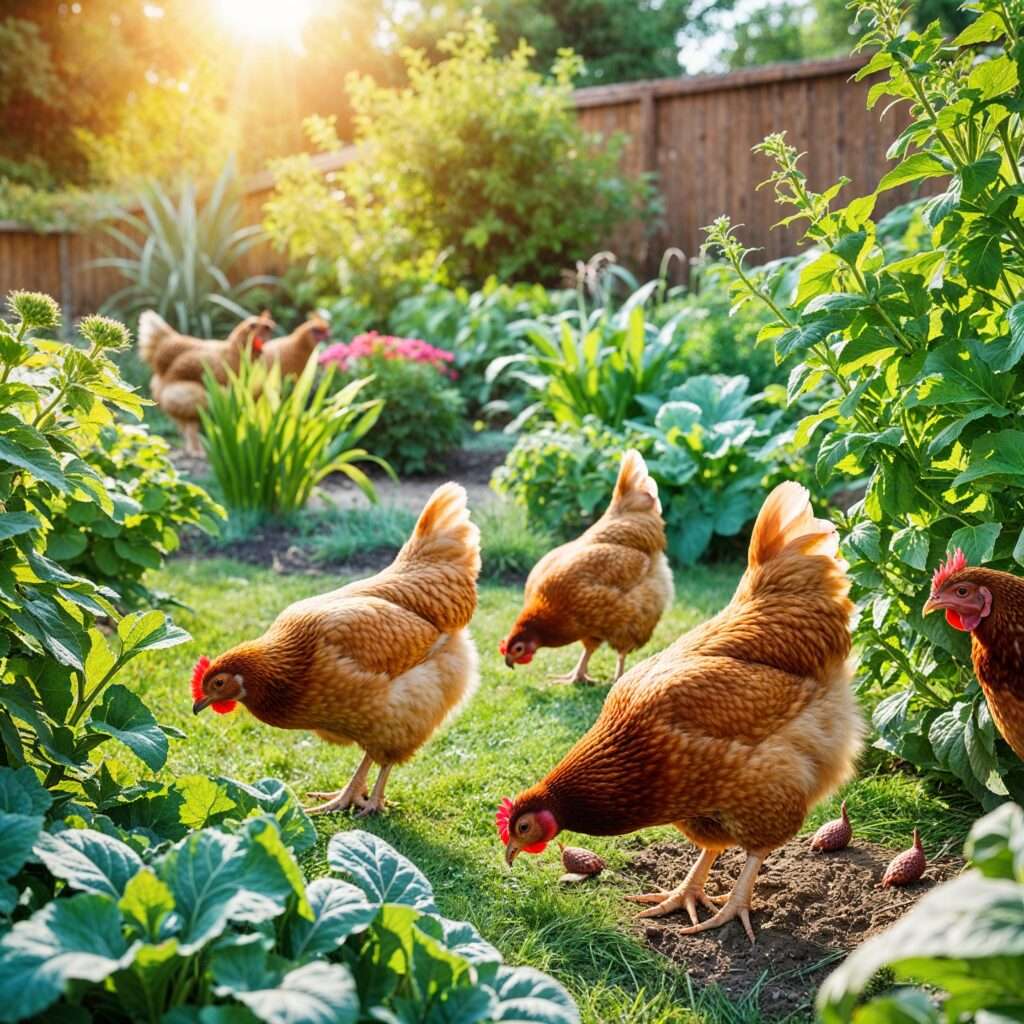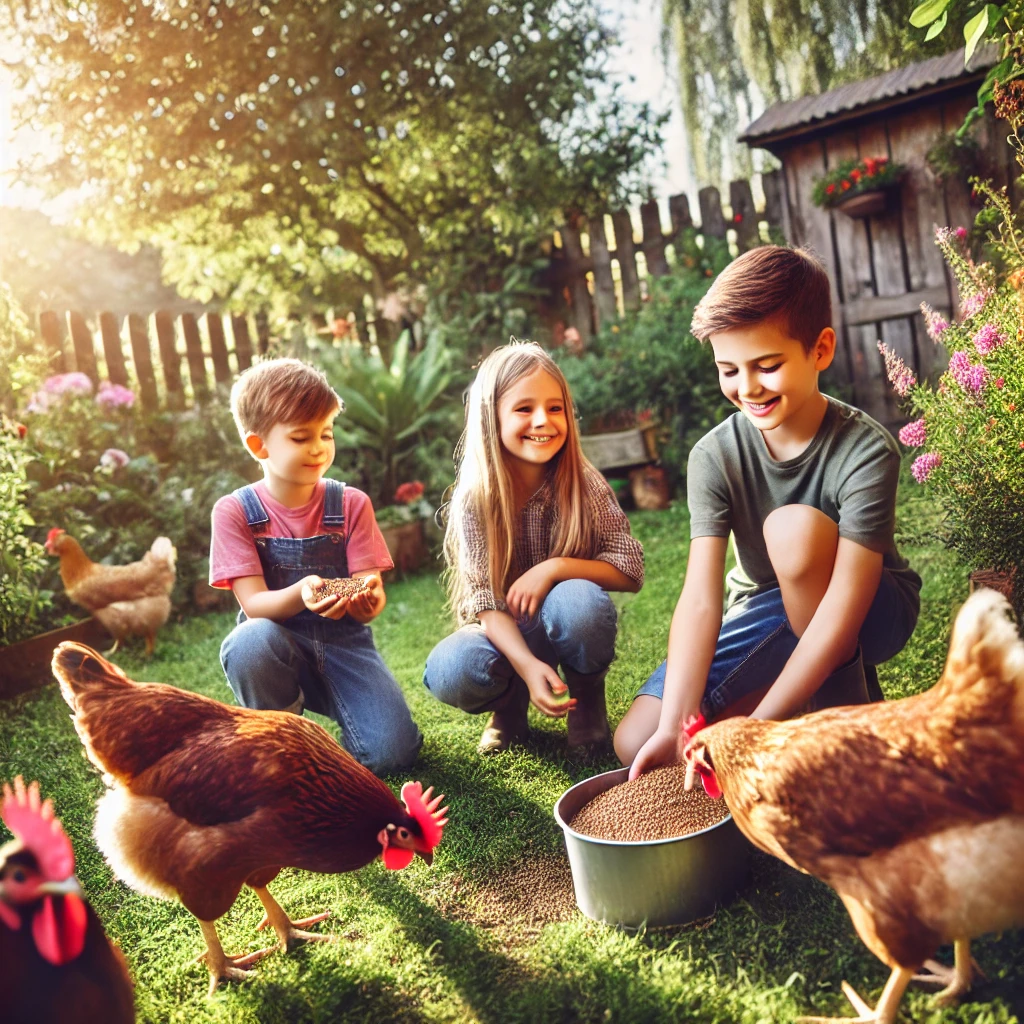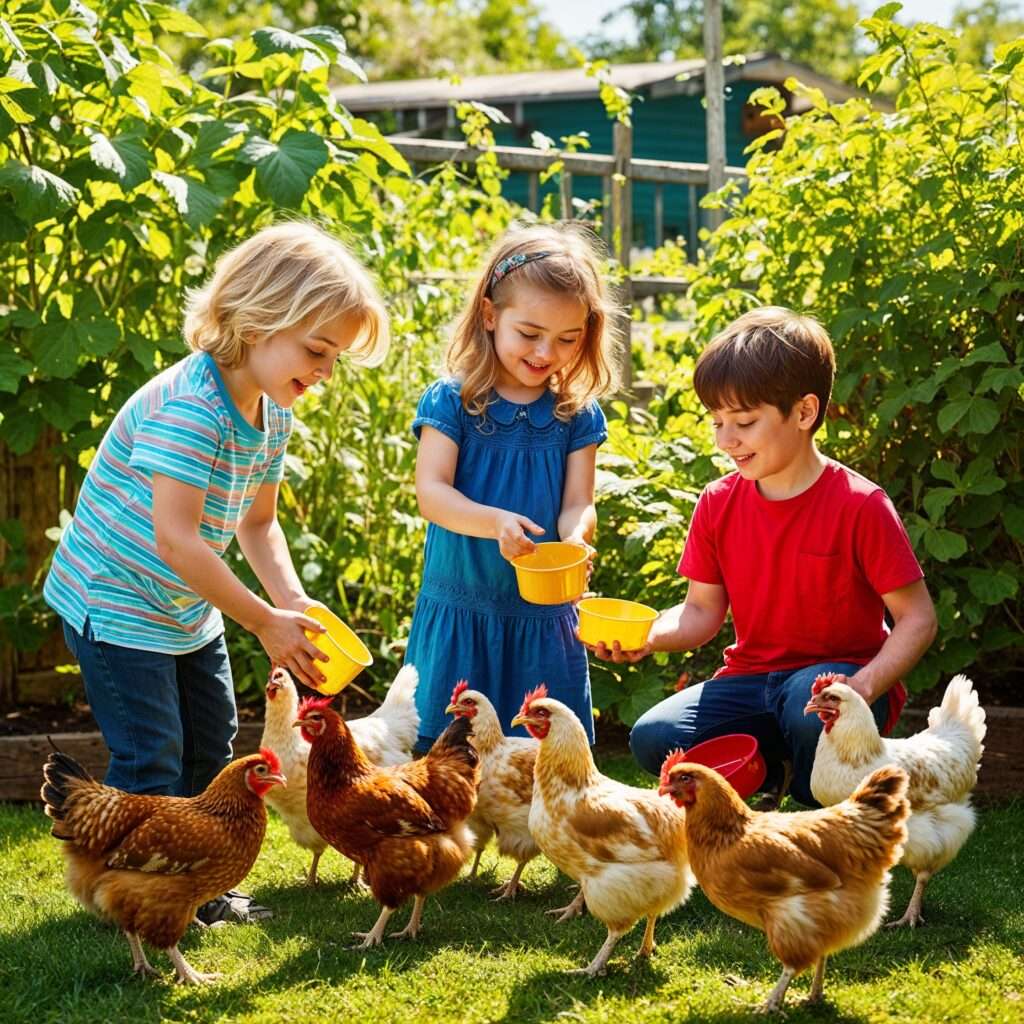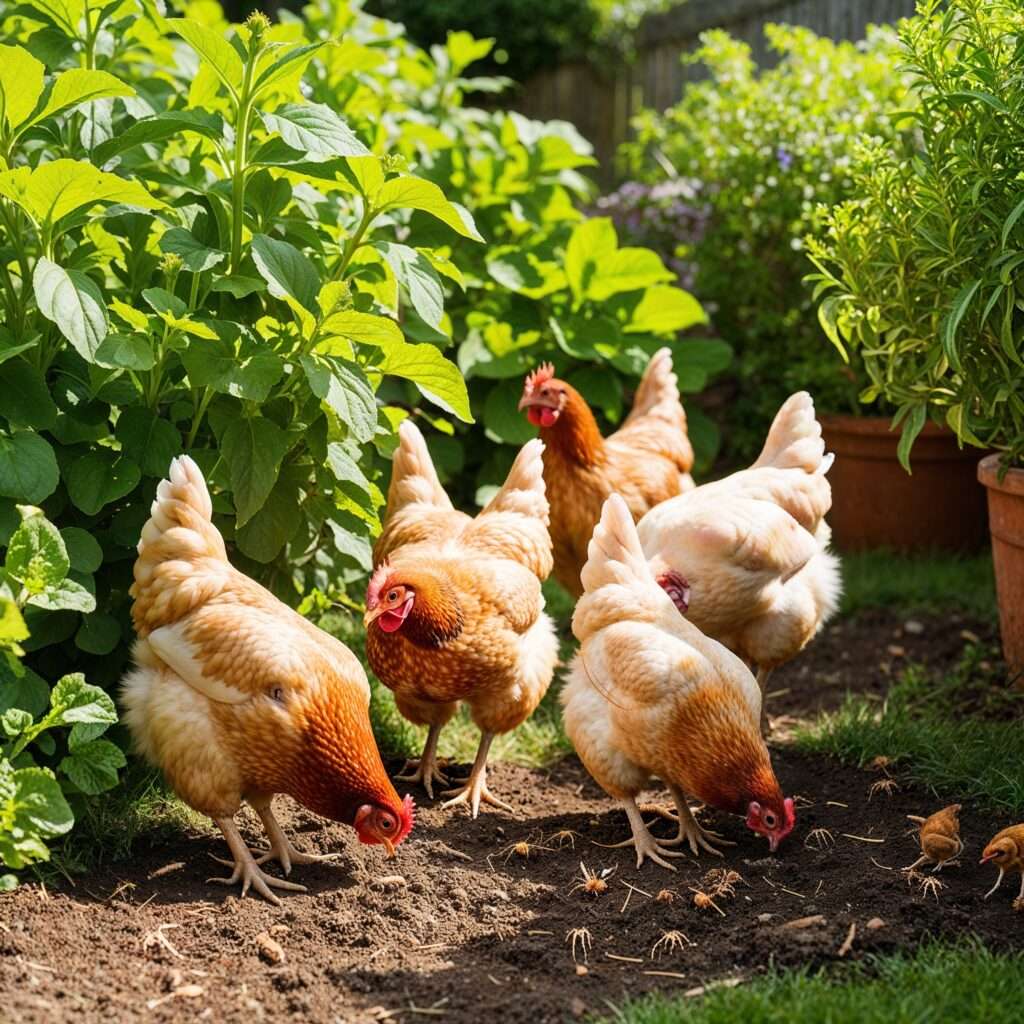
"A secure backyard with chickens, a family gathering eggs, and neighbors exchanging eggs for produce, emphasizing the benefits of raising backyard chickens for food security and resilience."
In today’s unpredictable world, the benefits of raising backyard chickens have become more relevant than ever. Whether you’re looking to secure a steady supply of fresh, nutritious eggs, reduce household waste, or take control of your food sources, backyard chickens offer a practical and sustainable solution. These feathered companions not only enhance your self-sufficiency but also bring surprising mental health benefits and contribute to a healthier ecosystem. Let’s explore why the benefits of raising backyard chickens make them an essential part of modern living.
Top Benefits of Raising Backyard Chickens

Fresh, Nutritious Eggs: A Key Benefit of Raising Backyard Chickens
Few things compare to the satisfaction of collecting fresh eggs from your own backyard. One of the most compelling benefits of raising backyard chickens is having a consistent, nutrient-rich source of food right at your fingertips. Imagine starting your day with eggs that are not only fresh but packed with more nutrition than their store-bought counterparts.
Studies show that backyard eggs contain:
- 25% more vitamin E to support healthy skin and a strong immune system.
- 38% more omega-3 fatty acids for brain and heart health.
- Significantly higher levels of beta-carotene, an antioxidant linked to eye health and disease prevention.
The flavor? Unparalleled. Unlike commercial eggs, which may sit on shelves for weeks, backyard eggs deliver vibrant yolks and superior taste. Additionally, with the cost of store-bought eggs rising sharply, raising chickens ensures a steady supply of affordable protein for your family. The convenience, health benefits, and savings make this a win-win.
Sustainability and Self-Sufficiency: Core Benefits of Raising Backyard Chickens
Sustainability starts at home, and chickens are the perfect companions in this mission. They serve as a cornerstone for anyone striving to reduce waste and live more eco-consciously. When you bring chickens into your life, you’re embracing a natural system where nothing goes to waste.
- Natural Fertilizer: Chicken manure is rich in nitrogen, phosphorus, and potassium—essential nutrients for your garden. Once composted, it transforms into a powerful, organic fertilizer that rivals store-bought alternatives.
- Food Waste Reduction: Chickens thrive on kitchen scraps, turning everything from vegetable peels to stale bread into nutritious eggs. This reduces your household’s food waste while cutting down on landfill contributions.
- Closed-Loop Systems: By integrating chickens into your household, you’re creating a self-sustaining cycle. Chickens eat scraps, fertilize your garden, and produce eggs—a perfect harmony that reduces reliance on external resources.
Moreover, raising your own chickens means fewer trips to the grocery store and less dependence on industrial food systems. This small but impactful step contributes to a more sustainable planet.

Natural Pest Control: A Safe, Eco-Friendly Solution
If you’ve ever battled pests in your garden, you’ll appreciate this benefit. Chickens are nature’s pest controllers, offering an eco-friendly alternative to chemical pesticides. Their diet naturally includes common garden nuisances such as ticks, beetles, flies, and even slugs.
When you let your chickens roam freely, they do more than just eliminate pests. They scratch and peck at the ground, aerating the soil and breaking up compacted dirt. This improves soil health, creating a better foundation for your plants.
Moreover, chickens help reduce the spread of tick-borne diseases in your yard, providing an additional layer of safety for your family. Unlike harmful sprays or traps, chickens handle pest control in a way that’s both efficient and completely natural.
Cost Savings: Chickens That Pay for Themselves
At first glance, raising chickens may seem like an expense, especially when considering the cost of a coop and supplies. However, the long-term financial benefits far outweigh the initial investment.
- Egg Savings: With egg prices ranging from $3–$6 per dozen, your flock of four hens could save you more than $300 annually. Over time, these savings add up significantly.
- Fertilizer Savings: By composting chicken manure, you eliminate the need to buy costly fertilizers for your garden, saving an additional $50–$100 per year.
- Waste Management: Chickens reduce household waste by consuming food scraps, cutting down on disposal costs.
Additionally, the peace of mind that comes from knowing your food supply is secure is invaluable. In today’s volatile economy, self-sufficiency isn’t just smart—it’s essential.

A Family-Friendly Project That Builds Responsibility
Raising chickens isn’t just a practical endeavor—it’s a joyful, family-friendly activity that fosters connection and learning. Chickens are easy to care for, making them an excellent introduction to animal husbandry for children.
- Teachable Moments: Daily tasks like feeding, cleaning, and collecting eggs teach kids responsibility and provide valuable lessons about life cycles and sustainability.
- Bonding Opportunities: Watching chickens’ quirky behaviors or working together to care for them creates lasting family memories.
- Hands-On Learning: Children gain a deeper understanding of where their food comes from and the importance of caring for animals and the environment.
Chickens offer a tangible way for families to connect with nature while instilling lifelong values of responsibility and stewardship.
Mental Health Perks: Surprising Benefits of Raising Backyard Chickens
Few activities are as grounding as spending time with animals. Chickens, with their gentle clucking and amusing antics, provide an unexpected source of mental health benefits.
- Stress Reduction: The rhythmic routine of caring for chickens lowers stress levels by creating a sense of structure and purpose.
- Mindfulness: Watching chickens forage and interact encourages you to slow down and focus on the present moment.
- Mood Boost: Animals are known to elevate serotonin levels, and chickens are no exception. Their cheerful energy can brighten even the most challenging days.
With backyard chickens, your home becomes a haven—not just for them, but for you as well. They bring life, energy, and peace to your outdoor space, making every moment spent outside more fulfilling.

Building Community Through Shared Chickens
Chickens have a unique way of bringing people together. Whether you’re swapping tips with fellow chicken keepers or sharing surplus eggs with neighbors, raising chickens fosters a sense of community.
- Shared Knowledge: Join local or online chicken-keeping groups to exchange advice and learn from others’ experiences.
- Egg Sharing: Surplus eggs provide an opportunity to connect with neighbors and strengthen relationships.
- Community Collaboration: Chickens can be the starting point for broader conversations about sustainability, gardening, and shared resources.
As more people embrace sustainable practices, chickens act as a bridge, creating connections and sparking meaningful conversations.
More Benefits of Raising Backyard Chickens
Educational Opportunities Beyond the Family

Raising chickens isn’t just a family-friendly project—it can extend to your community or school. Chickens provide unique hands-on learning experiences for children and adults alike, covering topics such as:
- Biology: Observe life cycles, egg development, and animal behavior.
- Environmental Science: Learn about composting, soil health, and sustainable practices.
- Civic Engagement: Use chickens to spearhead community initiatives like shared gardens or sustainability workshops.
Incorporating chickens into education broadens their impact beyond individual households, fostering greater awareness and stewardship.

Emergency Preparedness and Food Security
In a world of increasing disruptions—whether economic, environmental, or societal—having a resilient food source is vital. Chickens are a practical way to enhance preparedness:
- Reliable Food Source: Even during shortages or supply chain issues, your flock ensures access to eggs and potentially meat.
- Low Dependency: With chickens, you’re less reliant on external systems for essential resources.
- Bartering Potential: Surplus eggs can serve as a barter item in emergencies, adding another layer of resilience to your household.
For preppers or anyone concerned about food security, chickens are an invaluable asset.

Biodiversity in the Backyard
Chickens contribute to the ecological health of your backyard. Their presence promotes biodiversity by:
- Encouraging Pollinators: Chickens aerate the soil, fostering healthier plants that attract pollinators like bees and butterflies.
- Balancing Ecosystems: By consuming pests, chickens help maintain a natural balance without harming beneficial insects.
- Microbial Enrichment: Chicken droppings enhance the soil’s microbial activity, which supports healthier ecosystems.
This biodiversity not only benefits your garden but also creates a thriving environment for other wildlife.
Ethical and Humane Food Practices
For individuals concerned about the ethics of factory farming, raising chickens offers a more humane and transparent alternative. By keeping your own flock, you:
- Control Their Treatment: Ensure your chickens are well-cared-for and live in humane conditions.
- Know Your Food Source: Gain peace of mind about what goes into your eggs and, potentially, meat.
- Reduce Support for Factory Farming: Decrease reliance on industrial systems that often prioritize profit over animal welfare.
This aligns with the growing trend of consumers seeking ethically sourced food.
Aesthetic and Lifestyle Enhancement
Backyard chickens can also add charm and vibrancy to your outdoor space. Their presence enhances your yard in surprising ways:
- Natural Entertainment: Chickens’ quirky personalities and behaviors, like dust-bathing and foraging, are endlessly entertaining.
- Ornamental Breeds: Certain chicken breeds, such as Silkies or Polish chickens, are visually striking and can double as decorative additions to your landscape.
- Lifestyle Shift: Caring for chickens encourages spending more time outdoors, fostering a healthier, more active lifestyle.
For those seeking a balance between functionality and beauty, chickens offer the perfect blend.
Potential for Entrepreneurship
Raising chickens can open doors to small-scale entrepreneurial ventures. From selling surplus eggs to offering services or products, chickens can provide opportunities for:
- Egg Sales: Offer farm-fresh eggs to neighbors or local markets.
- Composted Fertilizer: Sell chicken manure compost as a premium garden product.
- Hatching and Raising Chicks: Start a small business selling chicks or pullets to others interested in backyard poultry.
Entrepreneurial chicken-keeping not only offsets costs but could even become a profitable side hustle.
Healthier Soil and Gardens
Chickens’ contributions to soil health go beyond fertilization. They also help with:
- Weed Control: Chickens naturally eat many types of weeds, reducing the need for manual weeding or herbicides.
- Tilling Assistance: Their scratching behaviors aerate and loosen the soil, making it more fertile and easier to plant in.
- Pest Interruption: By consuming pest larvae before they mature, chickens can break pest cycles, resulting in healthier crops.
Their dual role as gardeners and pest managers makes chickens invaluable for anyone aiming to cultivate a thriving backyard.
Social and Emotional Benefits
For some, chickens become more than just productive animals—they’re companions that enrich daily life. Benefits include:
- Therapy Animals: Chickens are increasingly recognized for their calming effect and can serve as emotional support animals for individuals struggling with stress or anxiety.
- Social Media Stardom: Unique chicken breeds or quirky flocks often gain followings online, making them a fun hobby for content creators.
Their ability to bring joy and connection shouldn’t be underestimated.
Why Backyard Chickens Are the Future
The benefits of raising backyard chickens extend far beyond fresh eggs and pest control. From promoting sustainability and self-sufficiency to improving mental health and fostering community connections, these birds play a vital role in transforming backyards into thriving ecosystems. In a time when food security and environmental consciousness are more important than ever, the benefits of raising backyard chickens provide a powerful way to take control of your lifestyle. If you’ve been considering starting a flock, now is the perfect time to embrace the rewarding journey of backyard chicken-keeping.
DARWIN’S TAKE
Backyard chickens are more than egg-laying machines—they’re symbols of rebellion in a world addicted to dependence. Each fresh egg is a crack in the industrial food system, each cluck a reminder that self-sufficiency isn’t just possible, it’s necessary.
They turn waste into life, pests into opportunity, and monotony into connection. In a collapsing ecosystem of convenience, these birds remind us that resilience starts in our backyards. Small feathers, big revolution.
Related Articles and Sources
For those interested in delving deeper into the world of sustainable living and backyard poultry, check out these related articles from Paranoid Prophet:
- 11 Benefits of Raising Chickens You Didn’t Know
This article highlights various advantages of keeping chickens, including organic egg production and natural pest control.
Source: - The Many Benefits of Backyard Chickens
An exploration of how backyard chickens contribute to sustainable living and provide fresh eggs.
Source: - 10 Benefits of Raising Backyard Chickens You Should Know About
A comprehensive look at the reasons to consider keeping chickens, from food security to educational opportunities.
Source: - 25 Advantages of Keeping Chickens in Your Own Yard
An extensive list detailing how chickens can enhance your backyard and lifestyle.
Source:
Discover More on Paranoid Prophet
To deepen your understanding of backyard chicken care and sustainable living, consider exploring the following articles from Paranoid Prophet:
- How Much Space Do Chickens Need? Best Guide for Healthy Backyard Flocks
This article provides detailed insights into the spatial requirements for maintaining a healthy and productive chicken flock, ensuring optimal living conditions for your birds.
Source:Paranoid Prophet - Can Chickens Eat Pumpkins? The Health Benefits and Risks Explained
Explore the nutritional advantages and potential hazards of feeding pumpkins to your chickens, helping you make informed dietary choices for your flock.
Source:Paranoid Prophet - How to Position and Elevate Your Chicken Feeder for Optimal Health and Efficiency
Learn practical tips on positioning and elevating chicken feeders to maintain feed cleanliness, reduce waste, and promote the overall health of your flock.
Source:Paranoid Prophet
These articles offer valuable guidance on various aspects of backyard chicken care, enhancing your journey toward sustainable and self-sufficient living.
FAQ: Your Questions About Raising Backyard Chickens Answered
General Questions
Q: What are the primary benefits of raising backyard chickens?
A: Backyard chickens provide a reliable source of fresh eggs, natural pest control, and nutrient-rich fertilizer for your garden. They also promote sustainability, reduce household waste, and foster a connection to nature and your food source.
Q: How many chickens should I start with?
A: For beginners, starting with 3–5 hens is ideal. This flock size ensures a steady supply of eggs (about a dozen per week) and is manageable for most backyard setups.
Q: Are chickens noisy or disruptive?
A: Hens are relatively quiet and make gentle clucking sounds. Roosters, however, can be noisy and may not be allowed in urban or suburban areas. Check local regulations before adding a rooster to your flock.
Care and Maintenance
Q: What do I need to get started with raising chickens?
A: You’ll need a secure chicken coop, bedding material (such as straw or pine shavings), chicken feed, fresh water, and basic supplies like feeders and waterers.
Q: How often should I clean the chicken coop?
A: A light cleaning every week and a deep clean every month is recommended to keep your chickens healthy and prevent odors or pests from accumulating.
Q: What do chickens eat?
A: Chickens eat a mix of commercial feed, kitchen scraps (like vegetable peels and grains), and insects they forage. Avoid feeding them processed foods, salty snacks, or anything toxic like avocado pits or chocolate.
Health and Safety
Q: How do I keep my chickens safe from predators?
A: Secure your coop with strong wire mesh and ensure it has a locking mechanism. Avoid using chicken wire alone, as some predators can tear through it. Let your chickens free-range only when supervised.
Q: What should I do if one of my chickens gets sick?
A: Isolate the sick chicken to prevent the spread of illness. Contact a veterinarian experienced with poultry and keep the flock’s environment clean and stress-free to promote overall health.
Q: Can chickens survive in extreme weather?
A: Chickens can adapt to a range of climates, but you’ll need to take precautions. Provide ventilation in summer and insulation in winter. Access to fresh water and shade in hot weather, as well as dry bedding and windbreaks in cold weather, are essential.
Regulations and Space
Q: Are there laws about keeping chickens in my area?
A: Local regulations vary, so check your city or county’s ordinances. Some areas limit flock sizes, restrict roosters, or require permits for backyard chickens.
Q: How much space do chickens need?
A: Each chicken needs at least 4 square feet of coop space and 8–10 square feet of outdoor run space. Free-ranging chickens need additional yard space to roam.
Egg Production
Q: How many eggs will my chickens lay?
A: Most hens lay 4–6 eggs per week, depending on the breed, their age, and environmental factors like daylight hours and diet.
Q: What should I do with surplus eggs?
A: Surplus eggs can be shared with neighbors, sold locally, or used in various recipes. You can also preserve them through methods like freezing or water glassing for long-term storage.
Q: Do chickens stop laying eggs in winter?
A: Many hens reduce or stop laying during winter due to shorter daylight hours. You can extend their laying period by providing supplemental light in the coop, though some keepers prefer to let their hens rest naturally.


